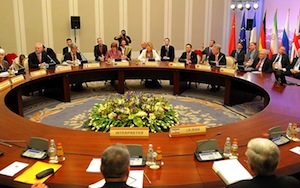Principles for Diplomacy with Iran
JINSA’s Gemunder Center Iran Task Force
Co-Chairs Ambassador Eric Edelman and Ambassador Dennis Ross
Click here to read the full report
 Momentum is once again building for diplomacy with Iran. The election of Hassan Rouhani as Iran’s president and his public embrace of a negotiated agreement has encouraged the Obama Administration and its international partners that a deal is feasible.
Momentum is once again building for diplomacy with Iran. The election of Hassan Rouhani as Iran’s president and his public embrace of a negotiated agreement has encouraged the Obama Administration and its international partners that a deal is feasible.
With time running out, a diplomatic agreement is the best or, more realistically, the least bad, means to prevent a nuclear Iran. However, a deal struck only for the sake of reaching a deal – one that simply kicks the can down the road rather than secures fundamental U.S. interests – is worse than no deal at all: it would still allow for a nuclear Iran, while surrendering crucial international leverage; it would undermine the legitimacy of any subsequent U.S. or, much more likely, Israeli attempts to arrest Iran’s nuclear progress by military action; it would discredit and compromise the strength of U.S. declarations; and it would weaken if not destroy the international nonproliferation regime.
Therefore the United States should only pursue a diplomatic agreement with Iran within certain parameters that ensure the deal actually furthers U.S. interests. As a corollary, American negotiators should be prepared to walk away from the table if their Iranian counterparts are unwilling to accept a deal within those boundaries. They should also make clear the alternatives to an acceptable deal are enhanced sanctions that could collapse Iran’s economy and/or a U.S. military strike. Furthermore, they must reiterate that the United States will always be supportive of the fundamental right of Israel and our other regional allies to ensure their self-defense. Certainly, Iran must realize it has the most to lose from the failure of diplomacy.
In a previous report we argued that, rather than engage in time-consuming confidence-building measures and incremental agreements that threaten to squander U.S. leverage, the United States could offer Iran a complete package, an end-game proposal, to test their intentions definitively in the relatively short time that remains before Iran attains an undetectable nuclear weapons breakout capability.
In this paper, we detail the principles that should determine the content of that package and the boundaries of U.S. negotiations with Iran. Based on these principles, we agree the optimal solution – and the one that would contribute the most toward peace and stability in the region – would be a settlement only permitting Iran to retain a civilian nuclear power program but no enrichment facilities or capabilities. The tenability of any actual agreement would need to be evaluated in terms of the principles we lay out here.